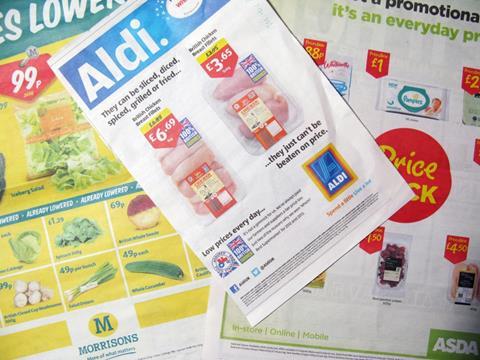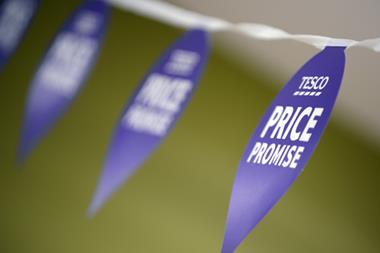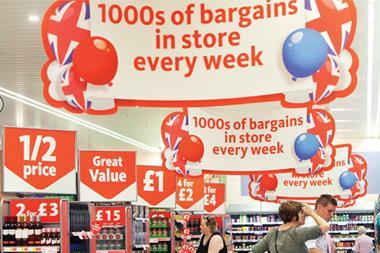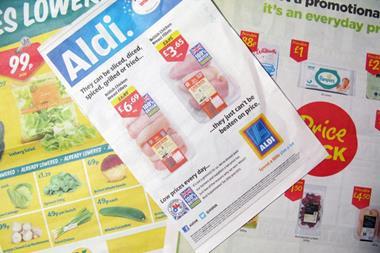
Which? has issued the Competition and Markets Authority with a ‘super-complaint’ regarding what it claims are misleading supermarket pricing practices.
Which? described its super-complaints as its “most powerful legal weapon” as the CMA will now be compelled by law to respond within 90 days as to whether it will launch an inquiry.
The consumer body said it has consistently identified a range of misleading and confusing pricing tactics in supermarkets – like dodgy multi-buys, shrinking products and baffling sales offers - that exaggerate discounts.
It argues that many retailers are creating the illusion of savings that don’t exist and are manipulating consumer spending by misleading people into choosing products they may not have chosen if they knew the full facts.
Which? warns that with £115 billion spent on groceries and toiletries in 2013, consumers could be collectively losing out to the tune of hundreds of millions of pounds, even if only a very small proportion of offers are misleading.
The pricing practices of concern are confusing and misleading special offers; a lack of easily comparable prices because of the way unit pricing is being done; and shrinking pack sizes without any corresponding price reduction.
It also claims supermarket price match schemes for a basket of goods may also make price comparisons more difficult, as the range and types of products on offer can make accurate price matching impossible to achieve.
“Despite Which? repeatedly exposing misleading and confusing pricing tactics, and calling for voluntary change by the retailers, these dodgy offers remain on numerous supermarket shelves. Shoppers think they’re getting a bargain but in reality it’s impossible for any consumer to know if they’re genuinely getting a fair deal,” said executive director Richard Lloyd.
“We’re saying enough is enough and using one of the most powerful legal weapons in our armoury to act on behalf of consumers by launching a super-complaint to the regulator. We want an end to misleading pricing tactics and for all retailers to use fair pricing that people can trust.”
This is the first time the body has issued a super-complaint since 2011 when it asked the Office of Fair Trading to investigate excessive credit and debit card surcharges.
In its complaint Which? has provided four examples of the practices it is concern about, these were:
Seasonal offers - where the higher price only applied out of season. We found a Nestle Kit Kat Chunky Collection Giant Egg was advertised at £7.49 for just 10 days in January at Ocado, but then sold on offer at £5 for 51 days (2015).
Was/now pricing - the use of a higher ‘was’ price where the item has been available for longer at the lower price. Heston from Waitrose Acacia Honey & Ginger Hot Cross Buns were advertised at £1.50 for just 12 days before going on offer at “£1.12 was £1.50” for 26 days (2015).
Multi-buys - prices increasing when going on multi-buy so that the saving is less than claimed, non-existent or products are more expensive when they are included in the multi-buy. Asda increased the price of a Chicago Town Four Cheese Pizza Two-Pack from £1.50 to £2 as it went onto multi-buy at two for £3. It went back to £1.50 as the ‘offer’ ended (2014).
Larger pack better value – where the individual item price of the bigger pack is actually more expensive. Tesco sold four cans of Green Giant Original Sweetcorn for £2 (was £2.44), but six cans were proportionately more expensive, at £3.56. That’s despite the fact the larger pack said ‘special value’ (2014).
Waitrose has emphatically denied it was engaged in any attempt to mislead and said the example cited by Which? was a ”genuine and isolated error” which actually benefitted the consumer.
Prior to the hot cross buns being on sale for £1.50 they had actually been on sale at the higher price of £1.69 since the beginning of the previous year.
”We are passionate about offering our customers genuine offers and clear prices. We’ve explained to Which? that as a result of a genuine and isolated error we did not ‘price establish’ these hot cross buns for long enough. However we would never deliberately mislead our customers,” said a Waitrose spokesman.
”Although this mistake was actually in customers’ favour and led to us selling this item for less than we should have done, we’ve taken steps to ensure we are accurate in future.”



















2 Readers' comments